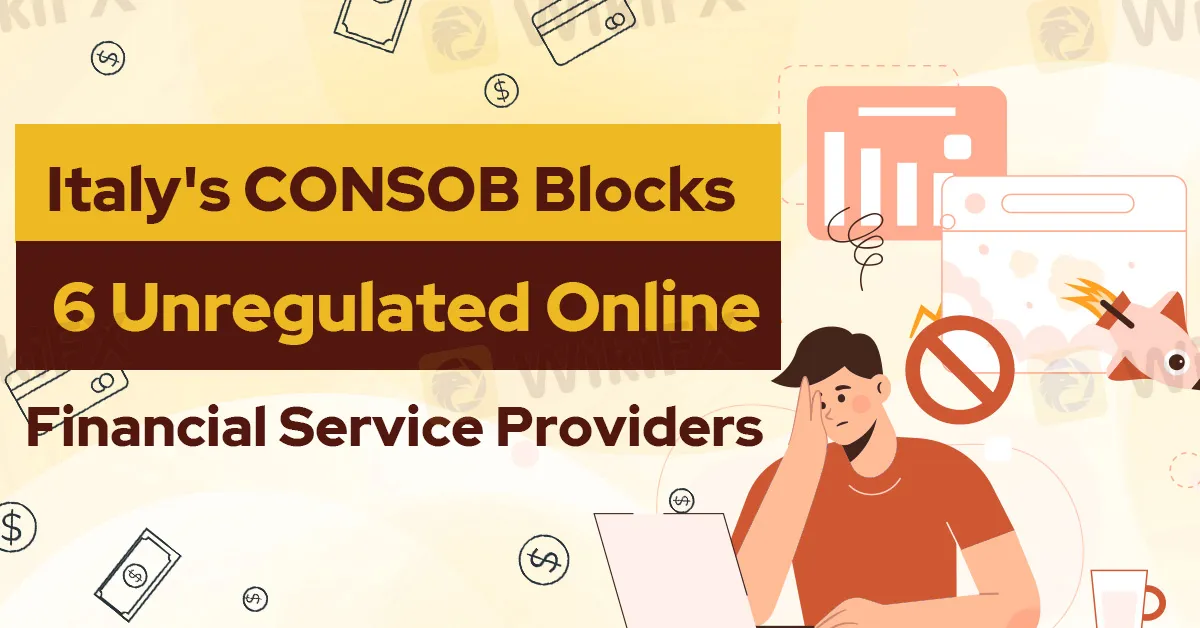简体中文
繁體中文
English
Pусский
日本語
ภาษาไทย
Tiếng Việt
Bahasa Indonesia
Español
हिन्दी
Filippiiniläinen
Français
Deutsch
Português
Türkçe
한국어
العربية
Italy's CONSOB Blocks 6 Unregulated Online Financial Service Providers
Abstract:Italy's financial watchdog, Consob, intensifies its crackdown on unauthorized financial service providers by blocking access to six new websites, aiming to shield Italian investors from potential fraud and risks associated with unregulated financial services.

Italy's financial regulatory authority, Consob, has taken a resolute stance against unauthorized financial service providers by blocking access to six new websites. The objective is clear: safeguarding Italian investors from potential fraud and risks associated with unregulated financial services.
Consob, the nation's Commissione Nazionale per le Società e la Borsa, has directed ISPs to block four offshore websites operating without authorization within the country. This aggressive move marks a significant step in combating unauthorized providers, part of Consob's ongoing efforts to shield retail investors from illegal financial services.
One concerning aspect flagged by Consob is the possibility for fraudsters to pose as legitimate financial services providers by registering domain names with relevant suffixes like '.bank' and '.fin'.
The crackdown extends beyond unauthorized providers, encompassing product offers from firms holding licenses in other jurisdictions. This strong regulatory action comes amidst the persistence of offshore brokers seeking online trading business in Italy.

Italian investors are cautioned against engaging with several flagged entities, including “BTX,” “Tide Technologies Group,” Fast-MNG EU Limited, “Alfacapitalinvest,” “Bitcoinup,” “UfinaCapital,” and Digital Trust CSP Fzco. These websites often employ tactics to lure inexperienced clients into trading highly leveraged products.
Consob's vigilance since July 2019, when granted authority to ban unregulated financial intermediaries' websites, has resulted in the blacklisting of a staggering 977 offshore sites.
The ultimate aim for the regulator is the eradication of unlicensed trading in Italy, fostering a secure environment for local investors. Employing a mix of AI-based algorithms, investigations, and customer reports, Consob identifies offshore operators engaging in illegal activities.
The regulatory arsenal expanded significantly when the 'Growth Decree' granted Consob extended powers. With this decree, Consob can instruct Italian ISPs to block websites in the region. However, due to technical constraints, the blackout might take several days to come into effect when websites temporarily shut down.
Consob's determined actions signal a relentless pursuit to clamp down on unlicensed trading activities, reinforcing a robust and protected landscape for Italian investors.

Disclaimer:
The views in this article only represent the author's personal views, and do not constitute investment advice on this platform. This platform does not guarantee the accuracy, completeness and timeliness of the information in the article, and will not be liable for any loss caused by the use of or reliance on the information in the article.
Read more

TradingPRO: A Closer Look at Its Licences
In an industry where safety and transparency are essential, the regulatory status of online brokers has never been more important. For traders seeking to protect their capital, ensuring that a platform operates under recognised and stringent oversight can make all the difference. Keep reading to learn more about TradingPRO and its licenses.

Oil Price Breakout Incoming? Investors Should Stay Alert
Oil prices are hovering around a critical level, with potential yet to be fully unleashed. Investors must prepare for sudden changes.

New SEBI Regulations on Intraday Trading
The Securities and Exchange Board of India (SEBI) has implemented revised regulations on Intraday trading, with effect from November 20, 2024. These regulations are meant to lessen risks and prevent speculative trading practices.

A Guide to Intraday Forex Trading You Can't Miss Out
Intraday trading where everything happens in a day fascinates millions around India and worldwide. The drama, the hype, and the ups and downs resulting from those are nothing short of an adventure. Read this guide to ace the forex intraday trading game.
WikiFX Broker
Latest News
eToro Review 2025: Top Trading Opportunities or Hidden Risks?
How much money will you earn by investing in Vantage Broker?
IronFX vs Exness Review 2025: Comprehensive Broker Comparison
Fraudsters Are Targeting Interactive Brokers' Users with Lookalike Emails
Interactive Brokers: Global Office Visits and Licensing Details
Top Tips to Choose the Best Forex Broker in 2025
SEBI Notifies New F&O Rules for Investors - New Derivative Trading Limits & More Amendments
ASIC Urges Financial Licensees to Fix Register Errors Before 2026 Deadline
U.S. Jobs Data Released: A Potential Boost for Gold Prices
SkyLine Guide 2025 Malaysia: 100 Esteemed Judges Successfully Assembled
Currency Calculator


